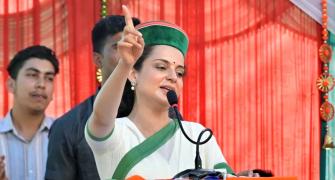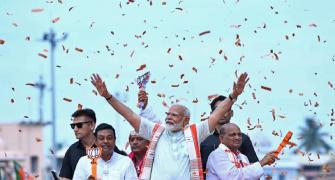Structural changes to government finances could be focus of the Union Budget, says Mihir S Sharma.
 In a fortnight, Finance Minister Arun Jaitley may well render the memory of his two previous, disappointing Budgets irrelevant.
In a fortnight, Finance Minister Arun Jaitley may well render the memory of his two previous, disappointing Budgets irrelevant.
His first Budget focused on too many throwaway "100-crore" schemes instead of resetting targets and methods; the second, although it featured a praiseworthy attempt to raise public investment, did not significantly alter the methods through which that would be financed - the Rs 70,000 crore (Rs 700 billion) boost to public investment it provided did not seem sustainable.
Most importantly, both Budgets appeared to lack coherence - a unified sense of purpose did not pervade them. They seemed the work of too many minds with too many competing objectives.
The advantage is that expectations are now much more rational than they were in either 2014 or 2015.
Mr Jaitley can exceed them easily. Indeed, a transformative Budget, of the sort that we have had very rarely in this country, is within his grasp.
It is true that the reform agenda extends far beyond just the Finance Bill, and there is much that a finance minister cannot do.
It is also true that, at a time of global uncertainty, a certain degree of caution is welcome - Mr Jaitley should resist calls to abandon fiscal targets, for example. Such abandonment, even if for the best of reasons, will not be read well by jittery world markets.
But there is nevertheless much that this finance minister can do - enough to, in fact, turn around the narrative. And all he has to do is to stick to the basics, and to his own tax-reform instincts.
Continuing down the fiscal consolidation path may be essential - but how he does it is as important. Each change that he makes must be to the basic structure of government finances - making revenue more broad-based, and reducing expenditure liabilities.
Read our full coverage on Union Budget 2016
Revenue
First, tax reform. The highlight of the last Budget was Mr Jaitley's far-seeing decision to phase out exemptions to the corporate income tax, while reducing the headline rate.
This intent ran in the opposite direction to much of the messiness that has pervaded thinking about taxes in this country, and cannot be praised enough.
From this year, the promised rationalisation process must start. In addition, he should provide a firm timeline for the phase-out of each exemption, so that no corporate lobbies can build up trying to protect one exemption or the other from the axe.
The intent underlying that move - of phasing out exemptions and tinkering, while moving to a lower-tax and higher-compliance regime - should be the sole motivation for all Mr Jaitley's tax changes in this Budget.
Reducing the prevalence of tax deducted at source - as is being suggested in some quarters - would militate against this vision of increased compliance and fewer exemptions. More, not fewer, transactions should require PAN numbers.
It may also be tempting to push 'Make in India' or 'Start Up India' through clever provisions and exemptions - but the finance minister surely knows that the only way that investment is really guaranteed is if investors see a clearer, simpler and more reliable tax environment on the horizon.
The private sector's energy should be directed towards innovation and investment, and not tax arbitrage.
Several committees have provided road maps on what to do about taxes - the Shome and Easwar Commitees in particular. Their recommendations include reform of tax administration as well as of policy. A credible effort to implement some of their reasonable suggestions is necessary.
One of the Easwar Committee's recommendations was to take away the tax officer's power to almost automatically levy a penalty if he disagrees with the taxpayer's assessment of her dues.
Eliminating this and other such automatic levies would go a long way to ensuring a less confrontational tax environment.
The goods and services tax (GST) continues to be held up - but Mr Jaitley should increase the pressure to pass it by ensuring that service tax rates are raised in order to harmonise with the likely eventual GST rate.
This would also have an additional, positive political fallout; it would take away one incentive for the Opposition to delay the GST - namely, to postpone the "inflationary" bump from such a hike in service tax to closer to the general elections.
Expenditure:
Here, again, Mr Jaitley can distinguish himself from past finance ministers and Budgets by focusing on structural change.
The government's progress on subsidy reform has been halting and slow. Hopefully, the finance minister has made the case to the prime minister and his political advisors that fuel prices are now low enough that a structural shift away from kerosene and fertiliser subsidies to direct cash support is feasible.
If not now, then it is difficult to see when it could happen. On the other hand, if Mr Jaitley's Budget accounts for this as changing in the coming year, then confidence that the Centre is structurally reducing its liabilities, and thus in India's macro-economic stability, will soar.
There are other ways to make the point that the Centre is cautious about taking on extra liabilities, and anxious to shed existing ones.
On the former, it may be necessary to postpone the implementation of the Seventh Pay Commission's recommendations. Given that we are in a low-inflation environment and there are no seriously contested assembly elections coming up, the political fallout will be manageable.
On the latter, what the government decides about the public sector, including banks and loss-making enterprises, will be crucial. For banks, realistic provisioning for recapitalisation must be made.
But even a hint that genuine reorganisation of state-controlled banking will take place this year - perhaps clearing the decks for some later privatisation - could go a long way towards repairing confidence.
Mr Jaitley must have tired of the complaints that his ministry is the one holding back reform from occurring in this government. This is an odd accusation, given its strictly limited mandate - and given also that reformist energy has been even less on offer from most other ministries.
It is a struggle for finance ministries to be more forward-looking than the governments they are in and the prime ministers they answer to.
In my opinion, this government's overall lack of policy vision has somewhat shackled the finance ministry, and its management of the economy has thus been capable, but not exceptional.
However, this year, even while focusing on little more than his own remit in terms of revenue and expenditure, and by trusting his reformist instincts, the finance minister could still present a Budget that transforms at least the structure of government finances.
And that would be more than we have had for a long time.
Read our full coverage on Union Budget 2016










